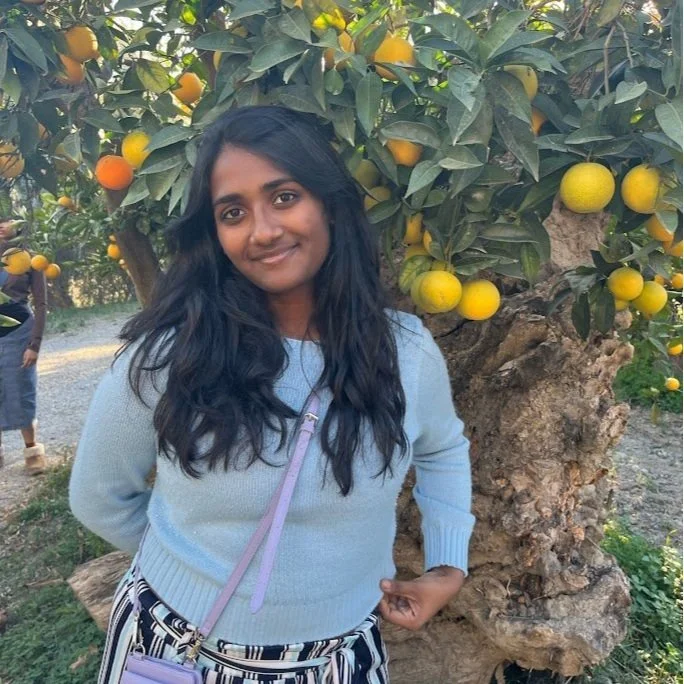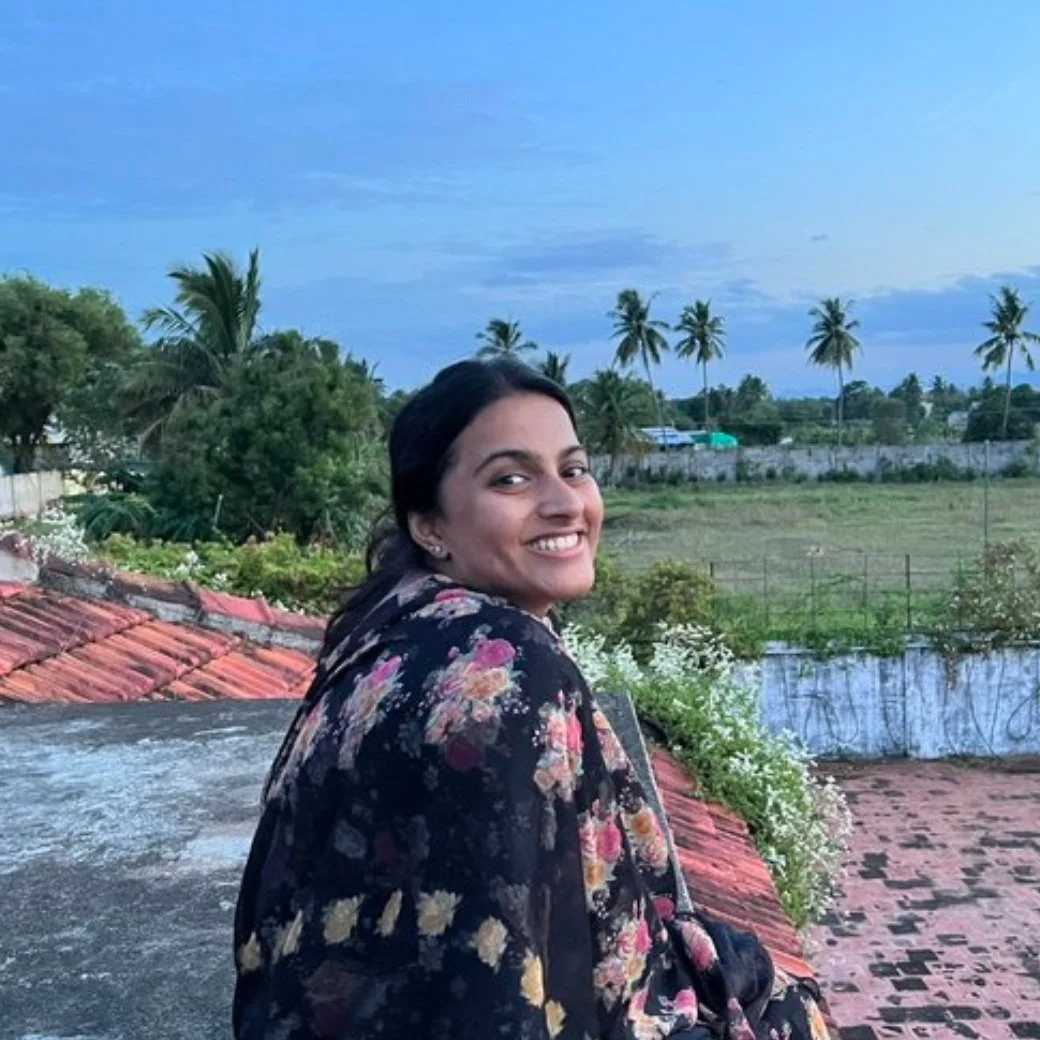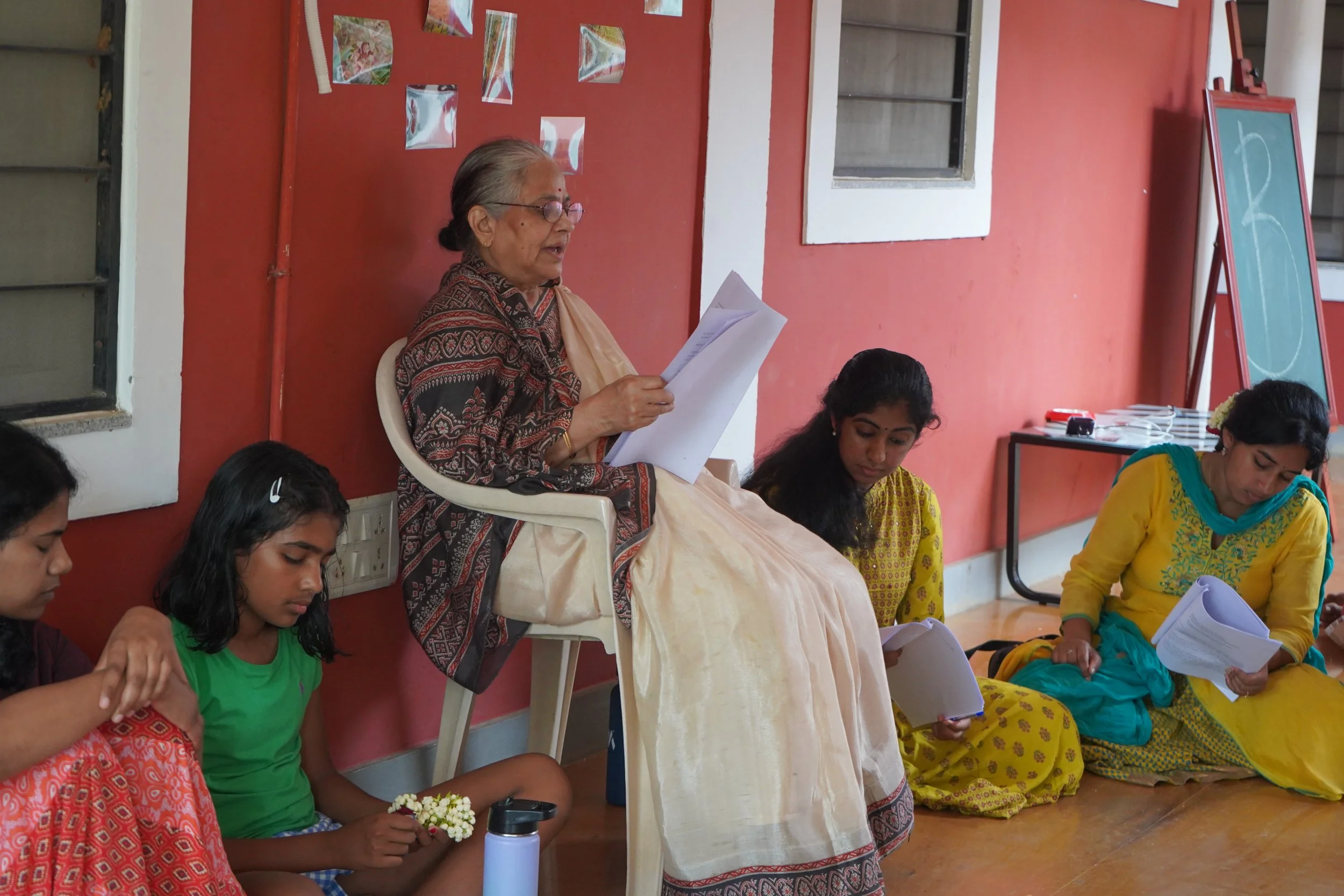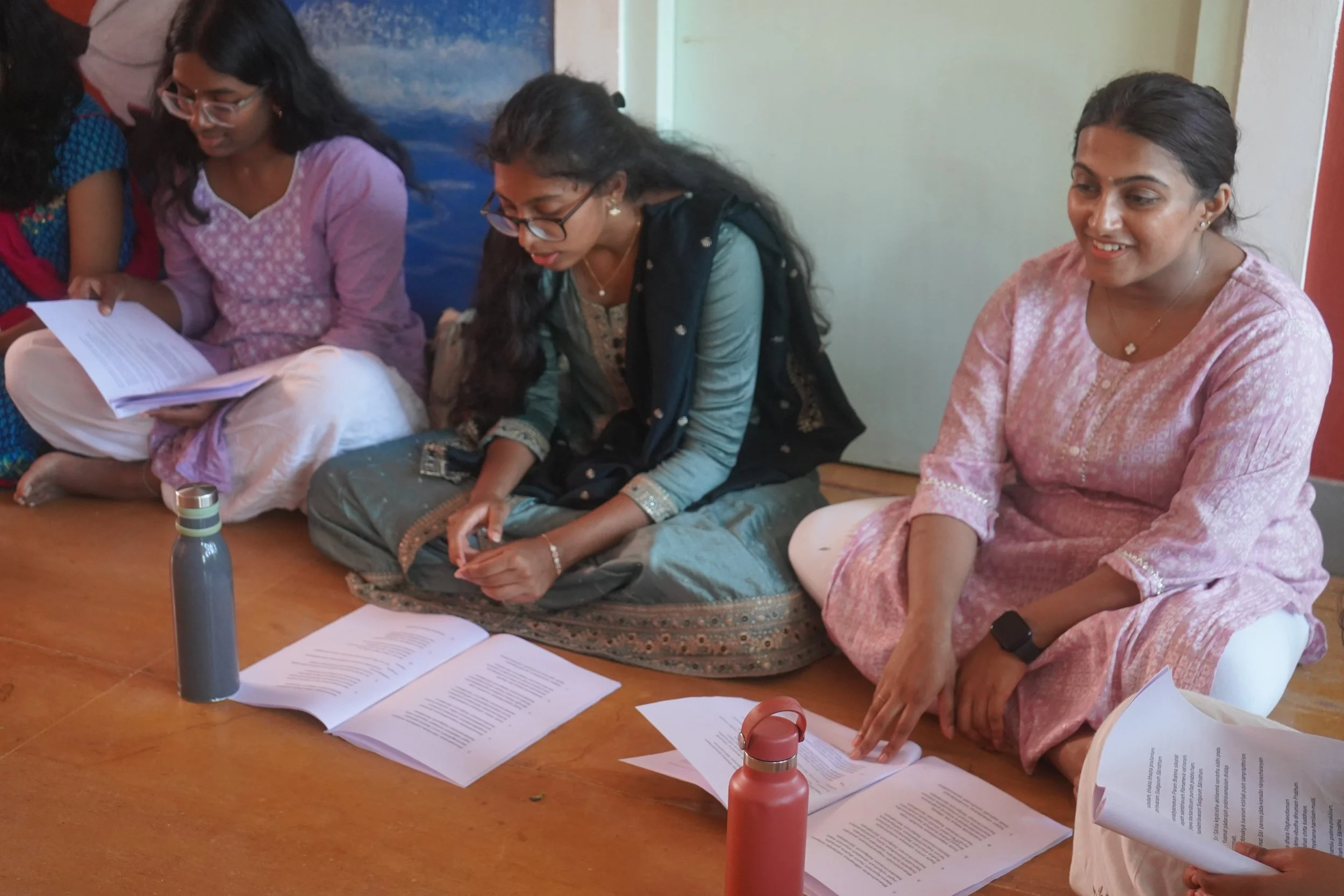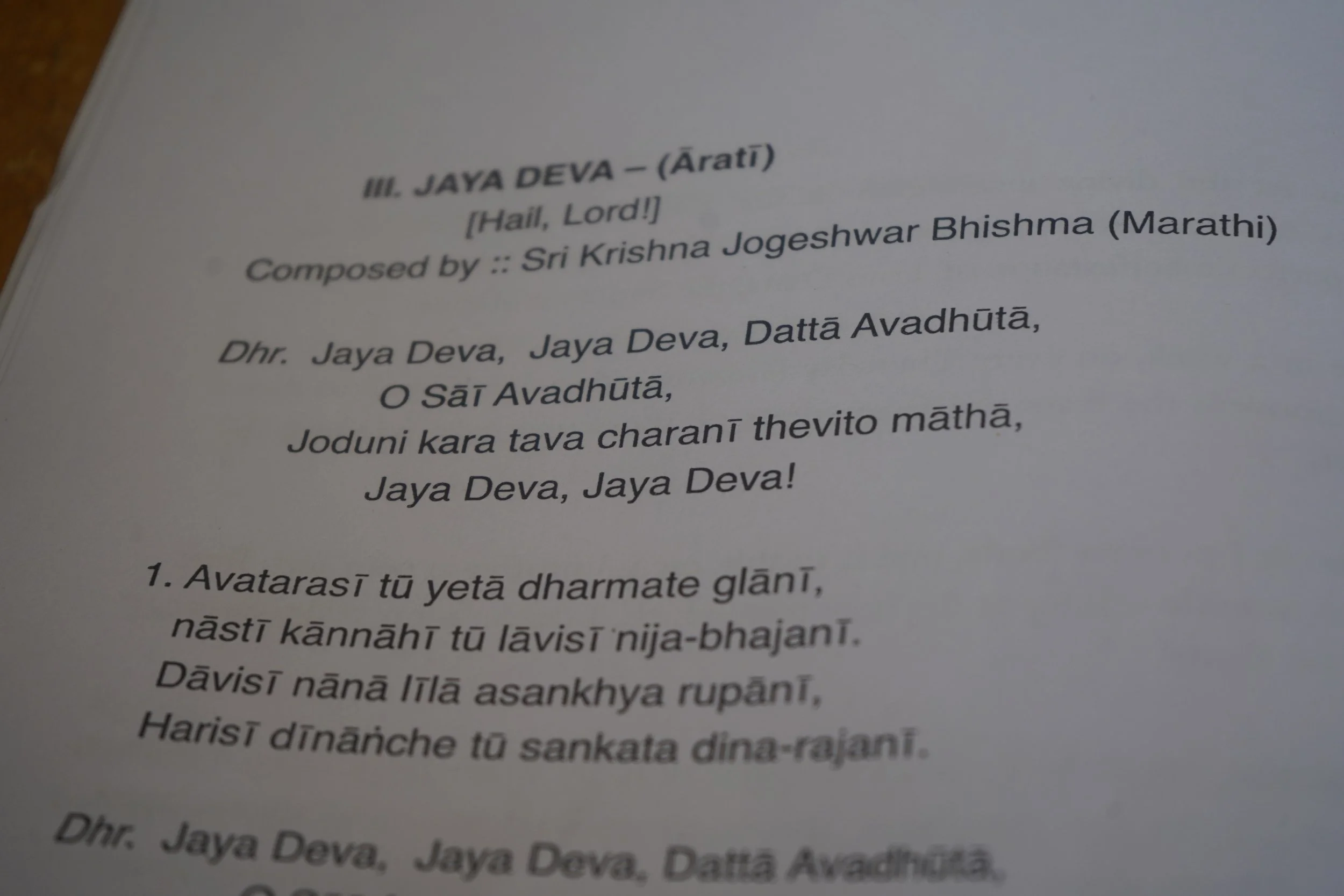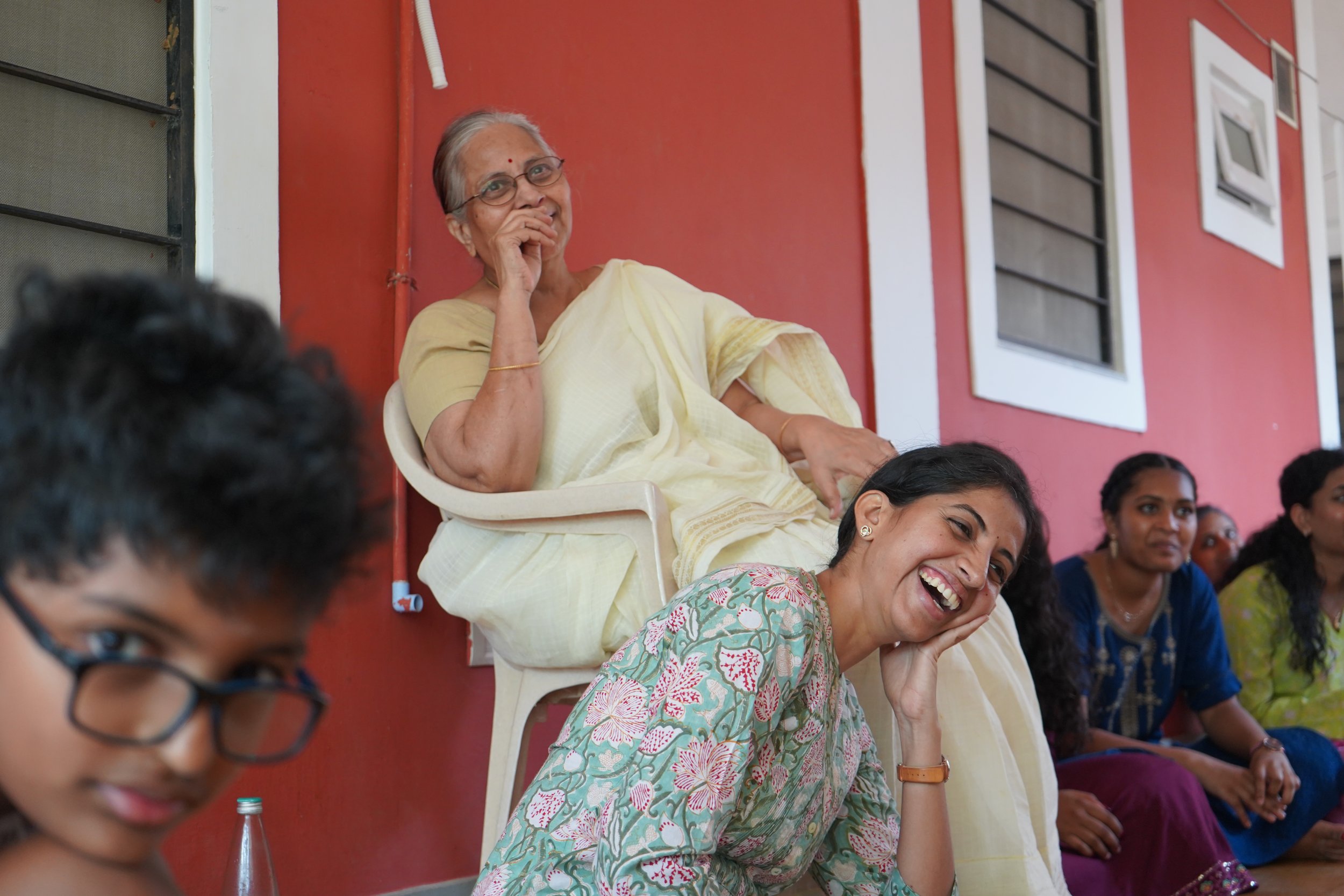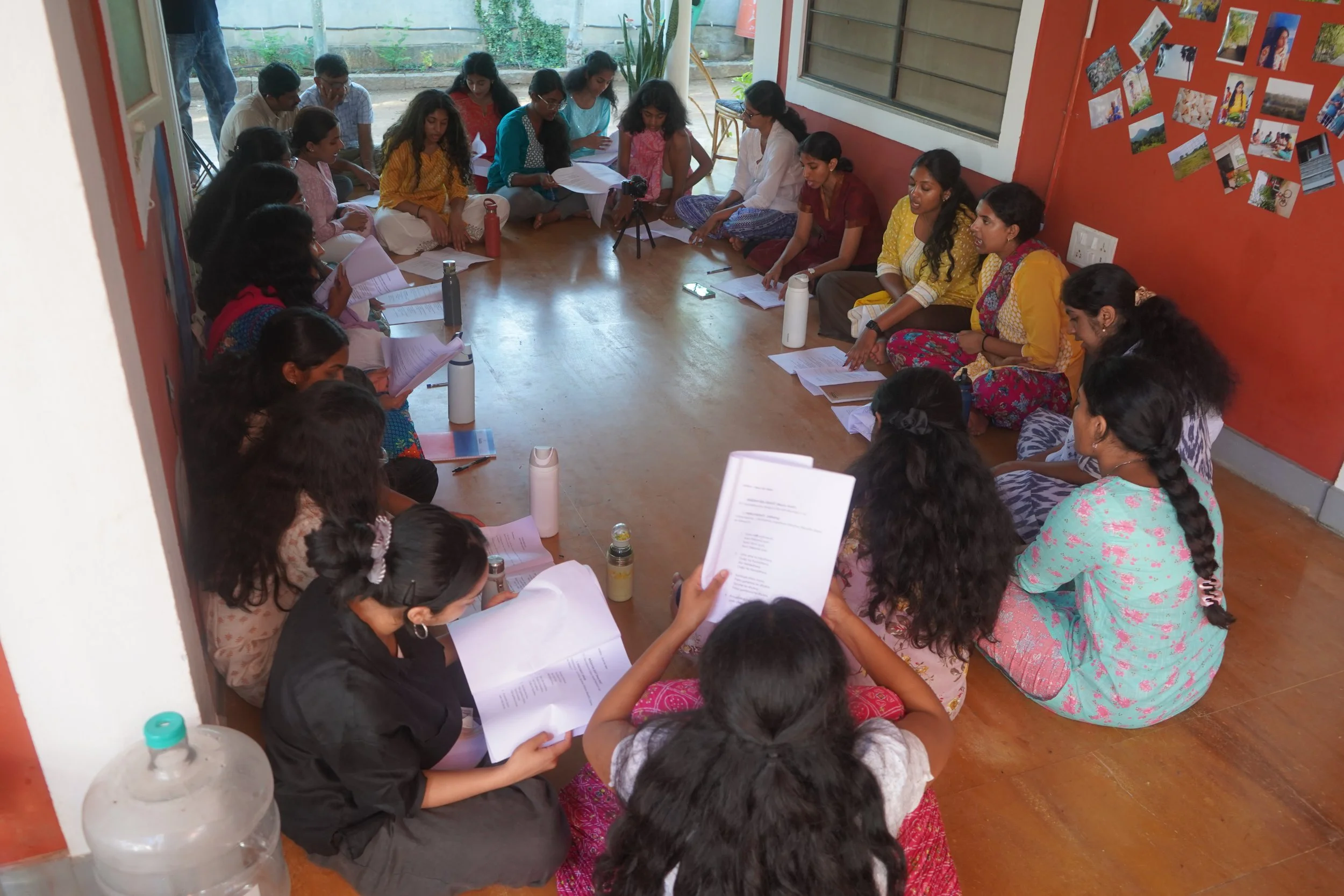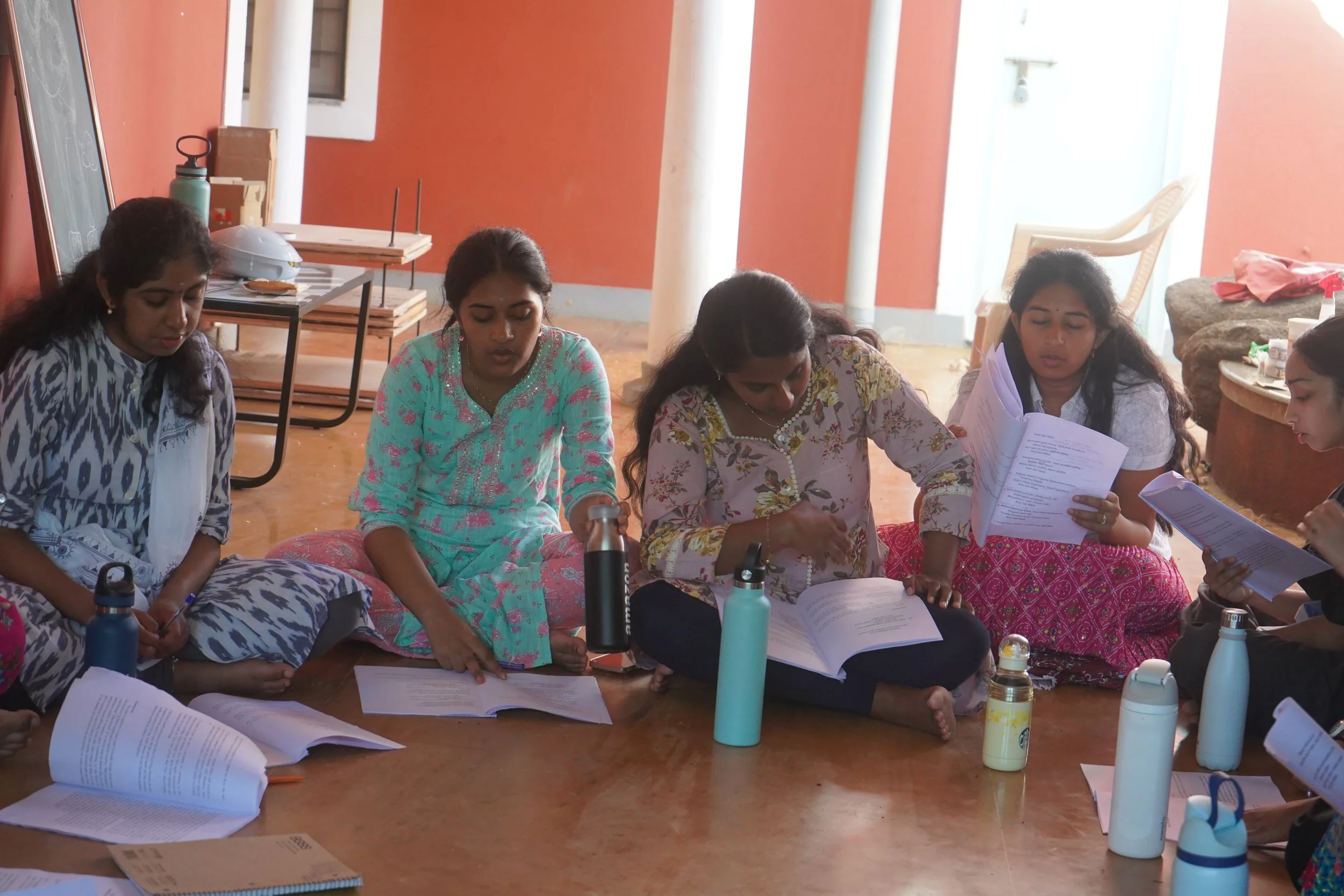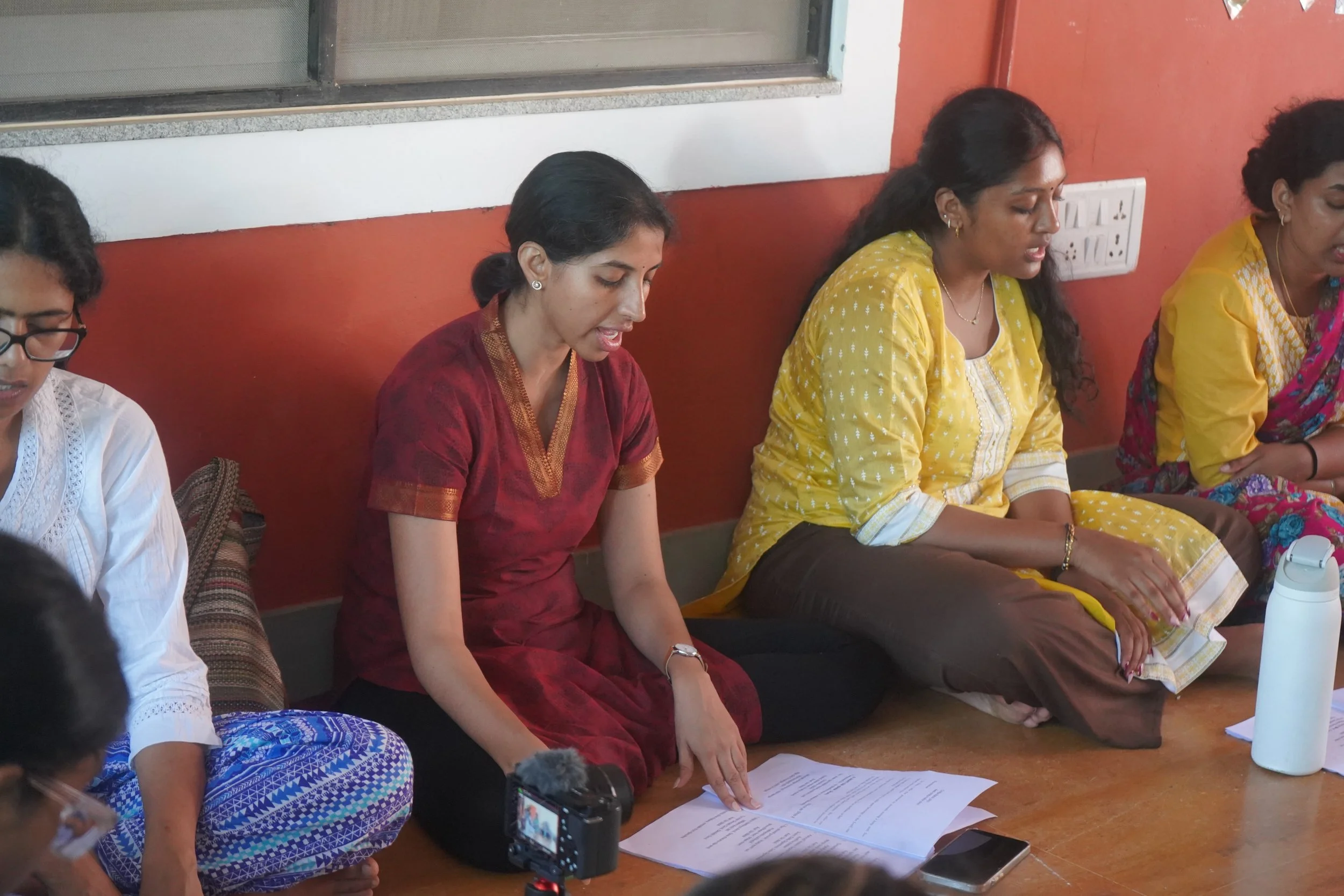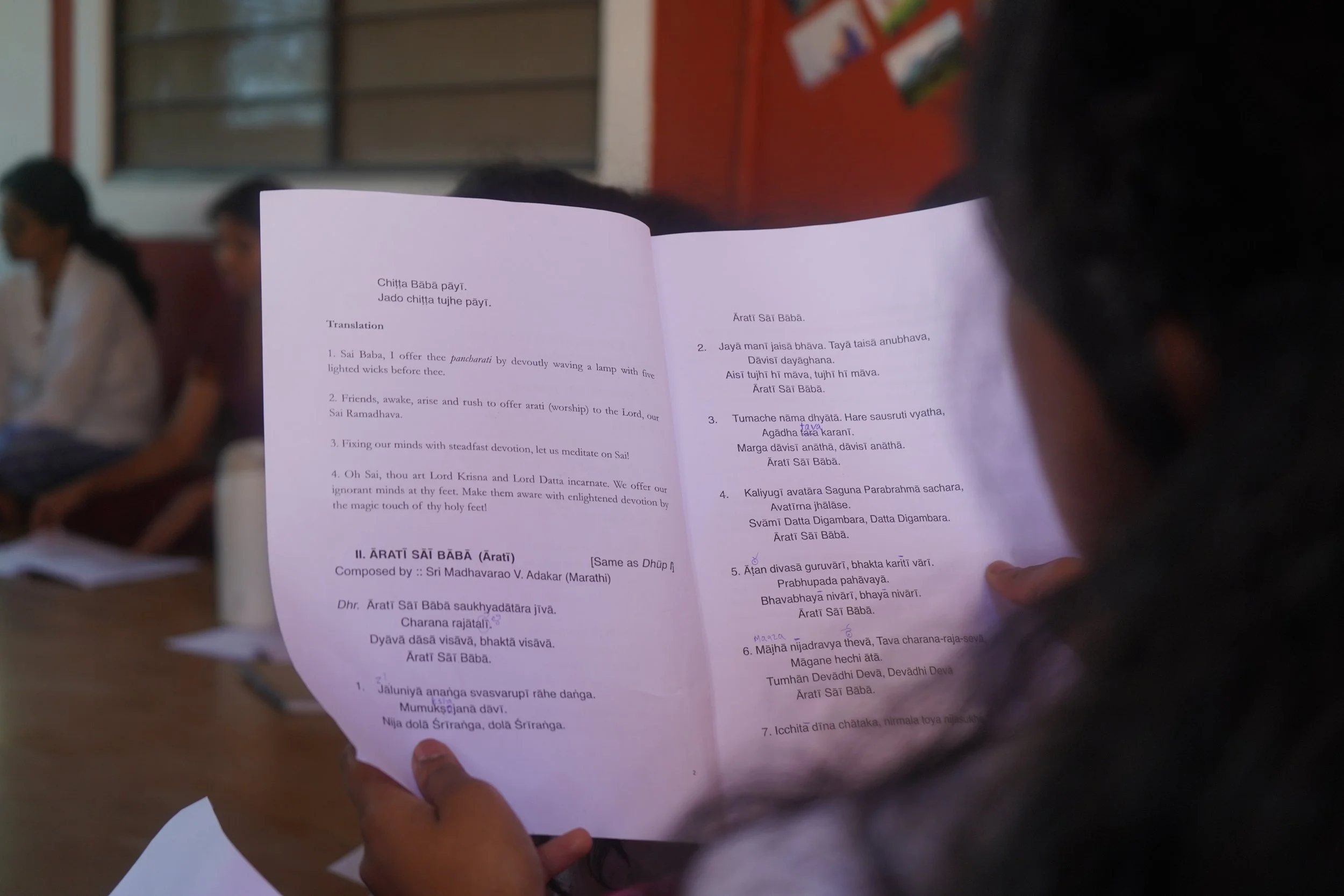Arati with Ammamma
Written by: Geetika Kullampalle, Jahnavi Sakhamuri, and Anvitha Voruganti
There’s something about Madhyan Arati that’s hard to put into words. Maybe it’s the way the melody settles into your chest, or the way certain lines feel like they’ve been part of you forever; even if you never fully understood them. For a lot of us, the arati has always been there in the background: at temples, during satsangs, or playing softly through a speaker at home. We sang what we could, mumbled what we didn’t know, and held onto the parts that made us feel something. But this summer at camp, that changed. With Ammamma teaching us, and Sruti Akka helping us understand the meaning behind the words, arati became more than just something we sang – it became something we felt. We weren’t just reciting anymore. We were learning. We were listening. And somewhere along the way, we found ourselves singing in a beautiful rhythm together.
Geetika
“We’re going to the Baba temple for arati,” my parents would say. And like clockwork, I’d find myself swaying side to side, surrounded by voices singing in unison. I would glance at the book in my sister’s hands, watching her try to sound out the words. But for me, reading those lines felt impossible; I couldn’t even read English properly back then, let alone decipher the Sanskrit and Marathi lyrics filled with diacritics. So, I swayed. I let the rhythm carry me until the very end of arati, when I’d shout with all my heart, “Sri Sachidananda Sadguru Sainath Maharaj Ki Jai!”, the one line I knew by heart, delivered with the confidence of someone who belonged.
When we arrived at camp and Akka announced that Ammama would be teaching us arati, my heart leapt. I was finally ready to learn the full Madhyan Arati. Still, a flicker of nervousness crept in; those same diacritics stared back at me from the page, taunting my past insecurities. But Ammama had a way of easing that fear. She went line by line, patiently guiding us through the pronunciation, never rushing, but always encouraging.
At first, our voices stumbled, hesitant and unsure. But slowly, we grew stronger, more certain. Sruti Akka helped us understand the meanings behind each verse, and suddenly, these weren’t just lyrics; we were singing poetry, history, and devotion. What started as a small group became a daily gathering that pulled in the whole camp: Uncles and Annas, Aunties and Akkas, and of course, us Geckos (and the ones on the ceiling too!). We sang in canons that eventually resolved into perfect harmony, our voices weaving together and filling Haritachala with warmth, grace, and something sacred.
One moment that stayed with me was during “Jaya Deva,” when Ammama explained the meaning of “Joduni Kara Tava Charani.” “It means to bow down to Baba,” she said. So, every time we sang that line, we all bowed our heads in unison. It wasn’t just a gesture, it was a shared moment of humility and reverence that made me feel deeply connected, not just to Baba, but to everyone around me.
Jahnavi
Among all the deeply personal and meaningful experiences at camp, one that stood out as both personal and unifying was learning the Madhyan Arati. What made it especially memorable was that we learned the arati from Ammagaru, who patiently and caringly taught us—syllable by syllable. Every day, usually in the mornings before lunch, every single person at camp, regardless of volunteer tasks, would gather around Ammagaru. We’d eagerly flip open our heavily annotated Arati booklets, the air filled with excitement and a shared determination to learn.
For many of us, singing the Arati had often meant confidently belting out the parts we knew—perhaps from times in Shirdi or local Baba temples—then trailing off into quiet mumbling or silence the remainder of the time. But this time was different. This was the first time many of us could clearly enunciate every word, understand its meaning, and truly appreciate the deep love and devotion the poets felt for Baba when they composed each line! Learning the Arati became a new way for each of us to express our love for Baba and Guruji. Listening to Ammagaru’s sweet, melodious voice lead the way, and then following her as a group, was a moment I cherished. I would’ve happily learned all day -and more-, simply because it would mean listening to and learning through Ammagaru’s loving guidance.
As part of the team that captured videos during camp, it was intriguing to witness—and capture—the genuinity and the collective emotion that dispersed in GTR. Some sat with eyes closed — not from sleepiness, but because they were deeply immersed. Others scribbled furiously, trying to record the beautiful interpretations of lines that Ammagaru would share. Some read the detailed pages of the meaning behind different portions of the Arati aloud, while others would lock eyes, smiling as they sang together in unbridled joy. It was one of those experiences that words can never fully do justice. It is an experience that when I close my eyes, I can picture the memory crisply! I’ll always be grateful for the chance to be able to learn the Arati from Ammagaru alongside people who crave a similar sense of community and connection that I do.
Anvitha
When I was younger I would always look forward to what we called “Monthly Satsang”. Where we would drive to San Diego or San Diego Gurubandhus would drive to LA and we would all have a big satsang. The reason why I liked these satsangs so much was because we used to sing Madhyan Arati! I would stand eagerly with the printed out paper in my hand and sing while reading the written version of it in English. Though I could never quite sing it properly — and still struggle to this day — I was simply so happy that we sang the full Madhyan Arati together.
Learning arati with Ammamma was such a blessing. Everyday we would all gather around GTR with our papers and pens ready to learn how to properly pronounce the words in the arati. We would also go over the meaning, and Sruti Akka would help us understand what the arati meant, so we knew what we were singing about. Ammamma patiently taught us, going over each word, stopping if we didn’t get it, and helped us until we thoroughly understood. My favorite part was once we finished each section or song we would all collectively sing it together. Though we would struggle a lot in the beginning, with Ammama’s encouragement and guidance we all slowly got the hang of it. In the harder aratis Ammamma would break down each word (sometimes letter by letter) so we could pronounce the words properly.
Learning the Arati was my favorite part of each day during camp. I’ve always felt a special connection to the Madhyan Arati — even at home, I would be so excited to go to the Baba temple just for it. If we ever went after it ended, or for a different Arati, I would feel so disappointed. So getting the chance to truly learn it and sing it every day at Haritachala — with Ammamma, Sruti Akka, all the Aunties, Uncles, and my fellow Geckos — was an experience I’ll always cherish. Towards the end, the way all our voices blended was so satisfying. I was so excited to go to Shirdi for Gurupornima so we could all sing the arati together, along with all our volunteer uncles and aunties!

